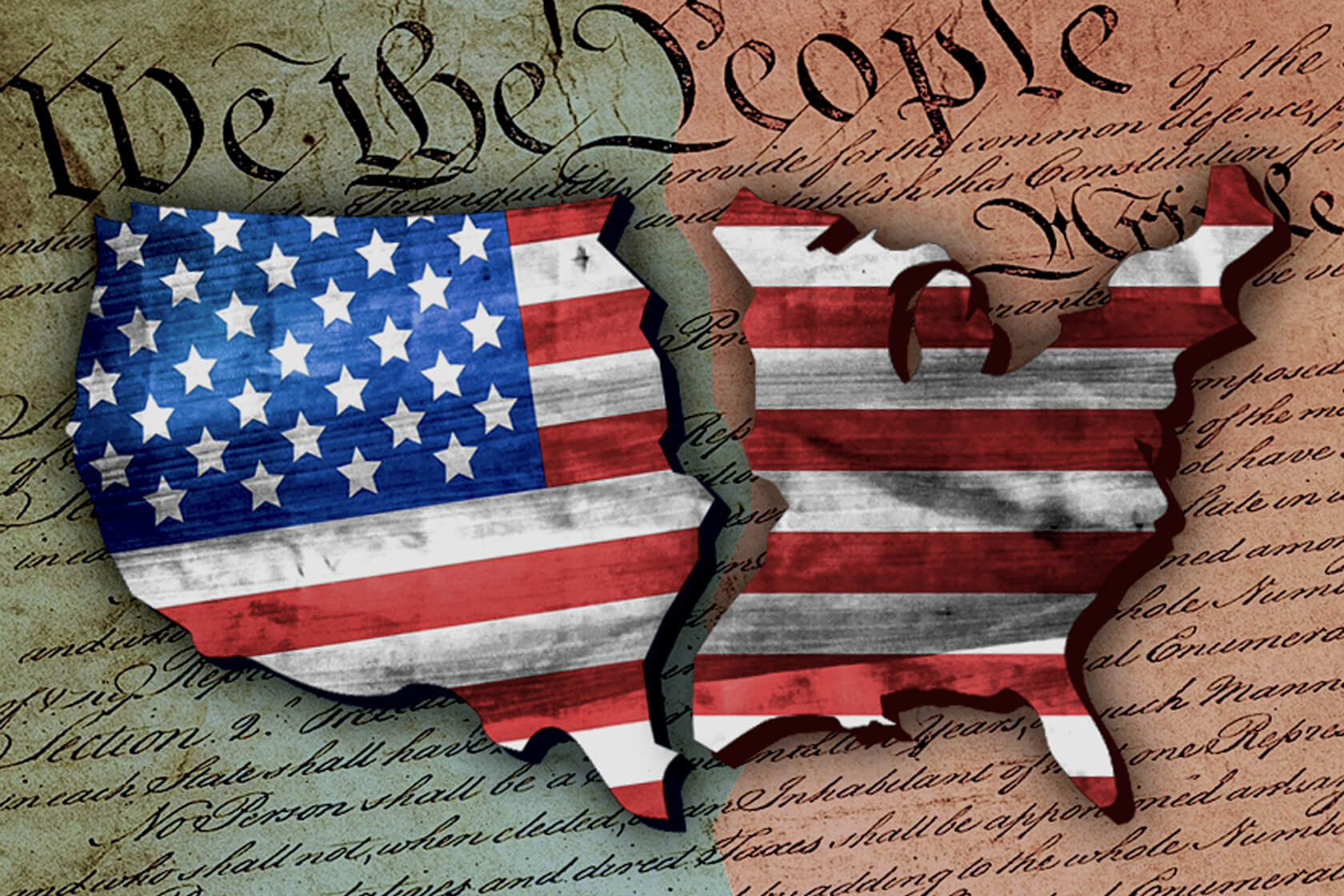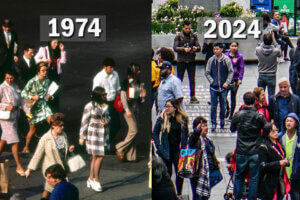West Long Branch, NJ – Less than half of the public feels that the American system of government is basically sound. This is the first time this view has fallen below a majority in the Monmouth (“Mon-muth”) University Poll. Public trust in the judgment of their fellow citizens has dropped significantly in the past generation. A majority of Americans have a great deal of concern that the country would suffer lasting damage if the opposite group’s policies were put into place. While most Democrats say a lack of compromise is the root of the problem in Washington, most Republicans feel too few officials are willing to stand firm. A majority of the public expresses some confidence in President Joe Biden’s ability to unify the country, but there is not an overwhelming belief that this will happen.
Less than half (44%) of the public believes the American system of government is basically sound. This includes 7% who say it needs no changes and 37% who say it needs some improvements. A majority (55%), though, say it is unsound at the current time – including 33% who say it is not too sound and needs many improvements and 22% who say it is not at all sound and needs significant changes. Since Monmouth started asking this question in 2017, between 50% and 55% said the American system of government was basically sound and between 45% and 49% said it was unsound. This question was first asked in a national Opinion Research Corporation survey back in late 1980, when a clear majority of 62% of the public felt our system of government was sound while 37% said it was not.
The view that the American system is not sound is held by similar majorities of Republicans (58%), Democrats (55%), and independents (54%) alike. Just one year ago, this view was marked by a sharp partisan divide, with only 28% of Republicans and 41% of independents saying it was not sound compared with 65% of Democrats.
“The increased lack of confidence in the American system is built on a foundation of partisan hostility. Those differences are no longer limited to views on policy. They now extend to an underlying distrust of our democratic institutions themselves. Partisan tribalism is coming home to roost in a way that threatens the very stability of our system,” said Patrick Murray, director of the independent Monmouth University Polling Institute. Murray added, “This is the environment in which this week’s impeachment trial takes place. Fear of the most fanatical part of the partisan base is a bigger driver of what many leaders are willing to do and say in public than are concerns about eroding trust in the democratic process itself.”
The poll finds that just 18% of the public has a great deal of trust and confidence in the American people as a whole when it comes to making judgments under our democratic system about the issues facing our country. Another 46% have a fair amount of trust in their fellow Americans. This 64% overall trust level is similar to prior Monmouth polls (58% in 2019 and 60% in 2016). However, this number was much higher more than a generation ago. The Gallup Poll found public trust on this question at 86% in 1976 before declining to 75% in 2004 and then to 64% in 2012. According to Monmouth’s polling, Democratic voter trust in the American people has increased since 2019, from 57% to 71%, while Republican trust has decreased 59% to 49%. Independent voter trust has gone from 56% in 2019 to 66% now.
A majority of the American public (52%) expresses a great deal of concern that the country would suffer lasting damage if people who hold core political principles different from their own were able to enact their policies. This opinion has hovered between 50% and 56% since January 2016. Another 36% have some concern about potential damage to the country if this happened. Only 1 in 10 have either not much (8%) or no (2%) concern. Majorities of Republicans (62%) and Democrats (54%) have a great deal of concern about the country suffering lasting damage if those with opposing political views were able to set policy, while 45% of independents feel the same.
“There is an abiding belief by many Americans that ‘the other side’ is not just wrong in their approach, but could actually destroy this country. This was a fringe view a generation ago,” said Murray.
Just under half (45%) of the public feels the American way of life is under a great deal of threat and 34% feel some threat, while only 1 in 5 say the threat level is either not much (14%) or not at all (7%). These overall results are similar to prior polls, but the number of Republicans who sense a great deal of threat to the American way of life has gone up from 48% in 2019 to 70% now, while the number of Democrats who feel this way has declined from 52% to 30%. This opinion among independents has remained fairly stable (46% in 2019 and 41% now).
Three in four Americans (75%) say that America is greatly divided when it comes to our most important values. Just 23% say Americans are united and in agreement on these values. The feeling that we are greatly divided has ranged from 68% (September 2019) to 78% (June 2020) since Monmouth started asking this question in 2016. This opinion has been bipartisan during that time, currently standing at 79% of Democrats, 79% of Republicans, and 70% of independents.
“The only thing we can agree upon is that we are fundamentally divided,” said Murray.
Looking ahead to the next year, 37% feel the country will become more united, which is up from 31% who felt this way just after the November 2020 election and 21% who felt this way in 2018. Another 26% believe we will become more divided, which is similar to November (25%) and down from 2018 (34%). Just over one-third (36%) say not much will change in terms of national unity (35% in 2020 and 40% in 2018). A majority (58%) of Democrats believe the country will become more united, which is up from 49% a few months ago and just 17% in 2018. Few Republicans agree (15% now and 13% in 2020, down from an already low 28% in 2018). Most Republicans, in fact, predict we will become more divided (53% now and 48% in November, up from 25% in 2018).
Most Americans are either very (19%) or somewhat (37%) confident that Biden will be able to unify the country. Another 18% are not too confident and 25% are not at all confident in the president’s ability to bring the country together.
A majority point to elected officials who are not willing to compromise (55%) as the cause of more problems in the federal government than elected officials who are not willing to stand up for their principles (41%). These results are similar to public opinion during the last years of Barack Obama’s administration, but the gap between the two views had narrowed during the Trump term – 45% lack of compromise and 41% lack of principles in 2019 – when there were just small differences among different partisans. Today, most Democrats (67%) point to a lack of compromise as the bigger problem in Washington, while most Republicans (54%) point to a lack of taking principled stands.
The Monmouth University Poll was conducted by telephone from January 21 to 24, 2021 with 809 adults in the United States. The question results in this release have a margin of error of +/- 3.5 percentage points. The poll was conducted by the Monmouth University Polling Institute in West Long Branch, NJ.
QUESTIONS AND RESULTS
(* Some columns may not add to 100% due to rounding.)
[Q1-12 previously released.]
13.What causes more problems in the federal government – elected officials who are not willing to stand up for their principles OR elected officials who are not willing to compromise? [CHOICES WERE ROTATED]
| TREND: | Jan. 2021 | Nov. 2020 | Sept. 2019 | Aug. 2016* | Jan. 2016 | Jan. 2015 |
| Not willing to stand up for their principles | 41% | 42% | 41% | 36% | 40% | 36% |
| Not willing to compromise | 55% | 51% | 45% | 55% | 50% | 54% |
| (VOL) Depends | 3% | 4% | 9% | 8% | 6% | 7% |
| (VOL) Don’t know | 2% | 3% | 5% | 2% | 5% | 2% |
| (n) | (809) | (810) | (1,161) | (803) | (1,003) | (1,003) |
* Registered voters
14.Which statement comes closer to your view: Americans are united and in agreement about the most important values OR Americans are greatly divided when it comes to the most important values? [CHOICES WERE ROTATED]
| TREND: | Jan. 2021 | Nov. 2020 | Late June 2020 | Sept. 2019 | Nov. 2018 | Dec. 2017 | March 2017 | Aug. 2016* |
| Americans are united | 23% | 21% | 18% | 27% | 20% | 23% | 22% | 27% |
| Americans are greatly divided | 75% | 76% | 78% | 68% | 77% | 72% | 75% | 70% |
| (VOL) Don’t know | 2% | 2% | 4% | 5% | 4% | 5% | 4% | 4% |
| (n) | (809) | (810) | (867) | (1,161) | (802) | (806) | (801) | (803) |
* Registered voters
15.Looking ahead to the next year, do you think the country will grow more united, more divided, or will not much change?
| TREND: | Jan. 2021 | Nov. 2020 | Nov. 2018 |
| More united | 37% | 31% | 21% |
| More divided | 26% | 25% | 34% |
| Not much change | 36% | 35% | 40% |
| (VOL) Don’t know | 1% | 9% | 5% |
| (n) | (809) | (810) | (802) |
15A.How confident are you that Joe Biden will be able to unify the country – very confident, somewhat confident, not too confident, or not at all confident?
| Jan. 2021 | |
| Very confident | 19% |
| Somewhat confident | 37% |
| Not too confident | 18% |
| Not at all confident | 25% |
| (VOL) Don’t know | 0% |
| (n) | (809) |
16.I’m going to read four statements about our American system of government. Listen carefully and then tell me which one is closest to how you feel: our system of government is basically sound and essentially needs no changes, our system is basically sound, but needs some improvement, our system is not too sound and needs many improvements, or our system is not sound at all and needs significant changes?
| TREND: | Jan. 2021 | Feb. 2020 | Nov. 2018 | Dec. 2017 | Nov. 1980* |
| Basically sound, no changes | 7% | 9% | 10% | 7% | 6% |
| Basically sound, some improvement | 37% | 46% | 42% | 43% | 56% |
| Not too sound, many improvements | 33% | 24% | 26% | 25% | 27% |
| Not sound at all, significant changes | 22% | 21% | 22% | 24% | 10% |
| (VOL) Don’t know | 0% | 1% | 1% | 2% | 1% |
| (n) | (809) | (902) | (802) | (806) | (1,103) |
* Source: Opinion Research Corporation
17.More generally, how much trust and confidence do you have in the American people as a whole when it comes to making judgments under our democratic system about the issues facing our country – a great deal, a fair amount, not very much, or none at all?
| TREND: | Jan. 2021 | Sept. 2019 | Aug. 2016* |
| A great deal | 18% | 16% | 13% |
| A fair amount | 46% | 42% | 47% |
| Not very much | 28% | 30% | 29% |
| None at all | 7% | 11% | 9% |
| (VOL) Don’t know | 1% | 2% | 2% |
| (n) | (809) | (1,161) | (803) |
* Registered voters
18.Thinking about people who hold core political principles that are different from yours, how much does it concern you that our country would suffer lasting damage if their policies were put into place – would you say a great deal, some, not much, or not at all?
| TREND: | Jan. 2021 | Nov. 2020 | Sept. 2019 | Aug. 2016* | Jan. 2016 |
| A great deal | 52% | 56% | 56% | 50% | 50% |
| Some | 36% | 29% | 28% | 34% | 33% |
| Not much | 8% | 8% | 7% | 9% | 9% |
| Not at all | 2% | 3% | 4% | 4% | 5% |
| (VOL) Don’t know | 1% | 3% | 4% | 3% | 4% |
| (n) | (809) | (810) | (1,161) | (803) | (1,003) |
* Registered voters
19.How much do you feel the American way of life is under threat right now – a great deal, some, not much, or not at all?
| TREND: | Jan. 2021 | Sept. 2019 | Aug. 2016* |
| A great deal | 45% | 49% | 47% |
| Some | 34% | 32% | 31% |
| Not much | 14% | 10% | 13% |
| Not at all | 7% | 7% | 7% |
| (VOL) Don’t know | 1% | 2% | 2% |
| (n) | (809) | (1,161) | (803) |
* Registered voters
[Q20-31 previously released.]
[Q32-40 held for future release.]
METHODOLOGY
The Monmouth University Poll was sponsored and conducted by the Monmouth University Polling Institute from January 21 to 24, 2021 with a national random sample of 809 adults age 18 and older. This includes 298 contacted by a live interviewer on a landline telephone and 511 contacted by a live interviewer on a cell phone, in English. Telephone numbers were selected through random digit dialing and landline respondents were selected with a modified Troldahl-Carter youngest adult household screen. Monmouth is responsible for all aspects of the survey design, data weighting and analysis. The full sample is weighted for region, age, education, gender and race based on US Census information (ACS 2018 one-year survey). Data collection support provided by Braun Research (field) and Dynata (RDD sample). For results based on this sample, one can say with 95% confidence that the error attributable to sampling has a maximum margin of plus or minus 3.5 percentage points (unadjusted for sample design). Sampling error can be larger for sub-groups (see table below). In addition to sampling error, one should bear in mind that question wording and practical difficulties in conducting surveys can introduce error or bias into the findings of opinion polls.
| DEMOGRAPHICS (weighted) |
| Self-Reported |
| 25% Republican |
| 41% Independent |
| 34% Democrat |
| 49% Male |
| 51% Female |
| 30% 18-34 |
| 33% 35-54 |
| 37% 55+ |
| 64% White |
| 12% Black |
| 16% Hispanic |
| 8% Asian/Other |
| 70% No degree |
| 30% 4 year degree |
Click on pdf file link below for full methodology and crosstabs by key demographic groups.




